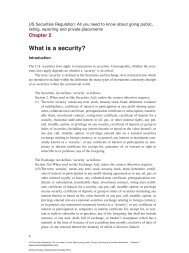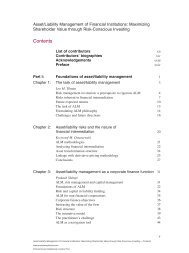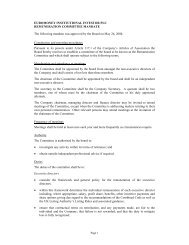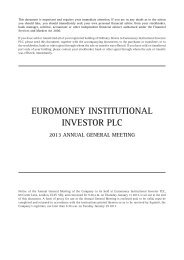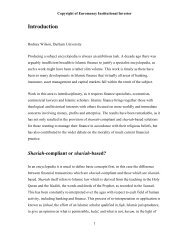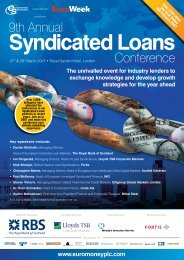Commentary on the TBMA/ISMA Global Master Repurchase
Commentary on the TBMA/ISMA Global Master Repurchase
Commentary on the TBMA/ISMA Global Master Repurchase
- No tags were found...
Create successful ePaper yourself
Turn your PDF publications into a flip-book with our unique Google optimized e-Paper software.
A Practical Guide to Using Repo <strong>Master</strong> AgreementsChapter 4<str<strong>on</strong>g>Commentary</str<strong>on</strong>g> <strong>on</strong> <strong>the</strong> <strong>TBMA</strong>/<strong>ISMA</strong> <strong>Global</strong><strong>Master</strong> <strong>Repurchase</strong> AgreementThis chapter provides a straightforward but detailed commentary <strong>on</strong> <strong>the</strong> <strong>TBMA</strong>/<strong>ISMA</strong> <strong>Global</strong><strong>Master</strong> <strong>Repurchase</strong> Agreement (<strong>the</strong> “<strong>TBMA</strong>/<strong>ISMA</strong> GMRA”). A segment of <strong>the</strong> Agreementtext is quoted first (shaded in grey) and explanatory commentary follows immediately belowit in each case.First, it might be useful to set <strong>the</strong> scene and outline <strong>the</strong> evoluti<strong>on</strong> of <strong>the</strong> <strong>TBMA</strong>/<strong>ISMA</strong> GMRA.Evoluti<strong>on</strong> of <strong>the</strong> <strong>TBMA</strong>/<strong>ISMA</strong> GMRAIn 1986 <strong>the</strong> US-based Public Securities Associati<strong>on</strong> (<strong>the</strong> “PSA”), now The B<strong>on</strong>d MarketAssociati<strong>on</strong> (“<strong>TBMA</strong>”), published its prototype repurchase agreement (governed by NewYork Law) covering US treasuries so as to provide <strong>the</strong> repo market with a standard agreementc<strong>on</strong>taining a number of basic legal protecti<strong>on</strong>s. The prototype included provisi<strong>on</strong>s for markto-marketprocedures; stated <strong>the</strong> rights of both parties when <strong>on</strong>e of <strong>the</strong>m defaulted; and soughtto ensure <strong>the</strong> availability of bankruptcy protecti<strong>on</strong>s. The PSA <strong>Master</strong> <strong>Repurchase</strong> Agreementwas revised in 1987 and by <strong>the</strong> early 1990s it was <strong>the</strong> industry standard document in <strong>the</strong> USrepo market.In November 1992 <strong>the</strong> PSA, in c<strong>on</strong>juncti<strong>on</strong> with <strong>the</strong> Internati<strong>on</strong>al Securities MarketAssociati<strong>on</strong> (“<strong>ISMA</strong>”) issued <strong>the</strong> “<strong>Global</strong> <strong>Master</strong> <strong>Repurchase</strong> Agreement” covering grosspaying securities o<strong>the</strong>r than US treasuries and equities, and subject to English law. TheAgreement was closely modelled <strong>on</strong> <strong>the</strong> standard form PSA <strong>Master</strong> <strong>Repurchase</strong> Agreementused in <strong>the</strong> US repo market.In November 1995 <strong>the</strong> PSA and <strong>ISMA</strong> published a revised versi<strong>on</strong> of <strong>the</strong> 1992Agreement motivated in part by <strong>the</strong> arrival of <strong>the</strong> new UK gilt repo market, which started <strong>on</strong>2 January 1996.The revisi<strong>on</strong>s included major changes to <strong>the</strong> margining provisi<strong>on</strong>s and <strong>the</strong> inclusi<strong>on</strong>,for <strong>the</strong> first time, of provisi<strong>on</strong>s dealing with agency transacti<strong>on</strong>s and fully documentedbuy/sellback transacti<strong>on</strong>s. Both <strong>the</strong> revised form of <strong>the</strong> PSA/<strong>ISMA</strong> GMRA and <strong>the</strong> GiltRepo Annex, which toge<strong>the</strong>r formed <strong>the</strong> Gilt Repo Legal Agreement, were published inNovember 1995, al<strong>on</strong>g with <strong>the</strong> Bank of England’s Gilt Repo Code of C<strong>on</strong>duct. This Codeof C<strong>on</strong>duct prohibited gilt repos being traded until a PSA/<strong>ISMA</strong> GMRA or <strong>TBMA</strong>/<strong>ISMA</strong>GMRA was executed.The success of <strong>the</strong> PSA/<strong>ISMA</strong> GMRA showed <strong>the</strong> advantages of standardised documentati<strong>on</strong>in reducing risk by eliminating undocumented or poorly documented transacti<strong>on</strong>s,reducing documentati<strong>on</strong> costs and lowering barriers to new market entrants. It was alsoA Practical Guide to Using Repo <strong>Master</strong> Agreementsplease visit www.eurom<strong>on</strong>eybooks.com or call +44 (0) 20 7779 8999 or USA + 1 800 437 9997© Eurom<strong>on</strong>ey Instituti<strong>on</strong>al Investor PLC31
A PRACTICAL GUIDE TO USING REPO MASTER AGREEMENTSfavoured by regulators, who decide <strong>on</strong> <strong>the</strong> amount of capital to be allocated to repos in abank’s trading book, because it reduced risk.Although an English law agreement, <strong>the</strong> PSA/<strong>ISMA</strong> GMRA, was also intended for usein <strong>the</strong> European cross-border market. It is still extensively used in countries o<strong>the</strong>r than <strong>the</strong>United States, sometimes in combinati<strong>on</strong> with country-specific annexes.On 30 November 2000 <strong>the</strong> <strong>TBMA</strong>/<strong>ISMA</strong> GMRA was published. A study of this isoffered below.Structure of <strong>the</strong> <strong>TBMA</strong>/<strong>ISMA</strong> GMRAThe basic structure of <strong>the</strong> <strong>TBMA</strong>/<strong>ISMA</strong> GMRA is:• a printed standard form master agreement c<strong>on</strong>taining provisi<strong>on</strong>s for all repurchase transacti<strong>on</strong>sbetween <strong>the</strong> Seller and <strong>the</strong> Buyer (a set of explanatory notes was also publishedand is worth reading);• various annexes as follows:i) Annex I: Supplemental Terms or C<strong>on</strong>diti<strong>on</strong>s. This enables <strong>the</strong> parties to make choicesin relati<strong>on</strong> to certain provisi<strong>on</strong>s of <strong>the</strong> <strong>TBMA</strong>/<strong>ISMA</strong> GMRA and to tailor <strong>the</strong> documentto suit <strong>the</strong>ir purposes and relative credit strengths. Negotiators negotiate Annex I;ii) Annex II: Form of C<strong>on</strong>firmati<strong>on</strong>;iii) Buy/Sell Back Annex;iv) Agency Annex and Addendum;v) Product Annexes for equities, gilts and bills of exchange; andvi) Country Annexes for Canada, Italy, Japan, <strong>the</strong> Ne<strong>the</strong>rlands, South Africa and Thailand.Parties choose which of <strong>the</strong>se Annexes <strong>the</strong>y want to apply to <strong>the</strong>ir <strong>TBMA</strong>/<strong>ISMA</strong> GMRA.The key features of <strong>the</strong> <strong>TBMA</strong>/<strong>ISMA</strong> GMRA are that:• repos are structured as outright sales and repurchases;• full legal title to securities and cash is transferred;• <strong>the</strong> Seller has an obligati<strong>on</strong> to return equivalent securities;• <strong>the</strong>re is provisi<strong>on</strong> for initial margin and top-up margin;• <strong>the</strong> equivalent of <strong>the</strong> coup<strong>on</strong> received from <strong>the</strong> issuer <strong>on</strong> a security is paid to <strong>the</strong> Seller <strong>on</strong><strong>the</strong> same day; and• legal title to collateral is robust, which overcomes doubts when an Event of Default occurs.In essence <strong>the</strong> <strong>TBMA</strong>/<strong>ISMA</strong> GMRA includes provisi<strong>on</strong>s dealing with payment and transferof securities and cash, margin maintenance, coup<strong>on</strong> payments <strong>on</strong> securities, reciprocal representati<strong>on</strong>sand warranties (dealing with authority, title to securities and tax), rights of substituti<strong>on</strong>,reciprocal events of default (which permit close-out of all transacti<strong>on</strong>s that are subjectto <strong>the</strong> <strong>TBMA</strong>/<strong>ISMA</strong> GMRA), and terminati<strong>on</strong> of individual transacti<strong>on</strong>s up<strong>on</strong> <strong>the</strong> occurrenceof specified tax events, as well as standard “boilerplate” clauses.The <strong>TBMA</strong>/<strong>ISMA</strong> GMRA can potentially cover repos and buy/sellbacks in equities,gross paying securities, net paying securities, US Treasury instruments, bills of exchange andcertificates of deposit. The Agency Annex allows Agency Transacti<strong>on</strong>s to be undertaken withdisclosed principals.When <strong>the</strong> <strong>TBMA</strong>/<strong>ISMA</strong> GMRA was revised in 1999/2000 it did not undergo major,wholesale radical surgery from its predecessor, <strong>the</strong> PSA/<strong>ISMA</strong> GMRA. Ra<strong>the</strong>r, <strong>the</strong>re was a32A Practical Guide to Using Repo <strong>Master</strong> Agreementsplease visit www.eurom<strong>on</strong>eybooks.com or call +44 (0) 20 7779 8999 or USA + 1 800 437 9997© Eurom<strong>on</strong>ey Instituti<strong>on</strong>al Investor PLC
COMMENTARY ON THE <strong>TBMA</strong>/<strong>ISMA</strong> GMRArefashi<strong>on</strong>ing of certain provisi<strong>on</strong>s inspired by market demand. This can be clearly seen byprinting off <strong>the</strong> blacklined versi<strong>on</strong> showing <strong>the</strong> differences between <strong>the</strong> two documents from<strong>ISMA</strong>’s website (www.isma.org under <strong>the</strong> Legal and Regulatory secti<strong>on</strong>).This is in stark c<strong>on</strong>trast to <strong>the</strong> process used in ISDA’s 2001 Margin Provisi<strong>on</strong>s, where aradical new regime for documenting collateralised transacti<strong>on</strong>s was proposed, but has still notbeen widely taken up by <strong>the</strong> market. While parties (usually less sophisticated <strong>on</strong>es) are stillentering into PSA/<strong>ISMA</strong> GMRAs, <strong>the</strong> <strong>TBMA</strong>/<strong>ISMA</strong> GMRA is in widespread use.Paragraph-by-paragraph analysis of <strong>the</strong> <strong>TBMA</strong>/<strong>ISMA</strong> GMRA<strong>TBMA</strong>/<strong>ISMA</strong>2000VERSIONGLOBAL MASTER REPURCHASE AGREEMENTDated as of_______________Between:__________________________and__________________________(“Party A”)(“Party B”)Headings and partiesThe <strong>TBMA</strong>/<strong>ISMA</strong> GMRA is dated as of a certain date. This is normally <strong>the</strong> date of signing before<strong>the</strong> first trade. Banks in Europe will not trade repos unless <strong>the</strong> <strong>TBMA</strong>/<strong>ISMA</strong> GMRA is signed andin place. In <strong>the</strong> United Kingdom this is a requirement of <strong>the</strong> Bank of England’s Gilt Repo Code.This differentiates it from <strong>the</strong> ISDA <strong>Master</strong> Agreement, where <strong>the</strong> agreement is often signed wellafter <strong>the</strong> date of <strong>the</strong> first trade and in <strong>the</strong> meantime <strong>the</strong> parties rely <strong>on</strong> <strong>the</strong> C<strong>on</strong>firmati<strong>on</strong>.There is a block where <strong>the</strong> parties state <strong>the</strong>ir full legal names. Usually, but not always,Party A prepares <strong>the</strong> draft of Annex I (which is what negotiators negotiate) and will produce<strong>the</strong> executi<strong>on</strong> copies when all points have been agreed by <strong>the</strong> parties.Paragraph 11. Applicability(a) From time to time <strong>the</strong> parties hereto may enter into transacti<strong>on</strong>s in which <strong>on</strong>e party,acting through a Designated Office, (“Seller”) agrees to sell to <strong>the</strong> o<strong>the</strong>r, acting➳A Practical Guide to Using Repo <strong>Master</strong> Agreementsplease visit www.eurom<strong>on</strong>eybooks.com or call +44 (0) 20 7779 8999 or USA + 1 800 437 9997© Eurom<strong>on</strong>ey Instituti<strong>on</strong>al Investor PLC33
A PRACTICAL GUIDE TO USING REPO MASTER AGREEMENTSthrough a Designated Office, (“Buyer”) securities and financial instruments(“Securities”) (subject to paragraph 1(c), o<strong>the</strong>r than equities and Net Paying Securities)against <strong>the</strong> payment of <strong>the</strong> purchase price by Buyer to Seller, with a simultaneousagreement by Buyer to sell to Seller Securities equivalent to such Securities at a datecertain or <strong>on</strong> demand against <strong>the</strong> payment of <strong>the</strong> repurchase price by Seller to Buyer.(b) Each such transacti<strong>on</strong> (which may be a repurchase transacti<strong>on</strong> (“<strong>Repurchase</strong>Transacti<strong>on</strong>”) or a buy and sell back transacti<strong>on</strong> (“Buy/Sell Back Transacti<strong>on</strong>”) shallbe referred to herein as a “Transacti<strong>on</strong>” and shall be governed by this Agreement,including any supplemental terms or c<strong>on</strong>diti<strong>on</strong>s c<strong>on</strong>tained in Annex I hereto, unlesso<strong>the</strong>rwise agreed in writing.(a) This sub-paragragh sets out <strong>the</strong> mechanics of a classic repo transacti<strong>on</strong>, and <strong>the</strong> obligati<strong>on</strong>sof <strong>the</strong> Buyer and Seller to each o<strong>the</strong>r. It also c<strong>on</strong>templates that <strong>the</strong> parties might actthrough branches of <strong>the</strong>ir respective organisati<strong>on</strong>s. Repo transacti<strong>on</strong> may be for a particularterm or <strong>on</strong> demand.Equities and Net Paying Securities are excluded unless selected in Annex I. (Annex I and<strong>the</strong> o<strong>the</strong>r Annexes are discussed at <strong>the</strong> end of this chapter.)(b) Repos and buy/sellbacks may be traded and covered under <strong>the</strong> <strong>TBMA</strong>/<strong>ISMA</strong> GMRA, andare called “Transacti<strong>on</strong>s” governed by it. They are also subject to <strong>the</strong> provisi<strong>on</strong>s of Annex Iunless o<strong>the</strong>rwise agreed in writing (which would be rare).(c) If this Agreement may be applied to(i) Buy/Sell Back Transacti<strong>on</strong>s, this shall be specified in Annex I hereto, and <strong>the</strong> provisi<strong>on</strong>sof <strong>the</strong> Buy/Sell Back Annex shall apply to such Buy/Sell Back Transacti<strong>on</strong>s;(ii) Net Paying Securities, this shall be specified in Annex I hereto and <strong>the</strong> provisi<strong>on</strong>sof Annex I, paragraph 1(b) shall apply to Transacti<strong>on</strong>s involving NetPaying Securities.(c) If buy/sellbacks are to be traded under <strong>the</strong> <strong>TBMA</strong>/<strong>ISMA</strong> GMRA, this must be stated inAnnex I and <strong>the</strong> provisi<strong>on</strong>s of <strong>the</strong> Buy/Sell Back Annex will apply to <strong>the</strong>m. If ei<strong>the</strong>r partywants to enter into Net Paying Securities under <strong>the</strong> <strong>TBMA</strong>/<strong>ISMA</strong> GMRA, this must also bestated in Annex I and Annex 1, paragraph 1(b) will apply to <strong>the</strong>m.(d) If Transacti<strong>on</strong>s are to be effected under this Agreement by ei<strong>the</strong>r party as an agent,this shall be specified in Annex I hereto, and <strong>the</strong> provisi<strong>on</strong>s of <strong>the</strong> Agency Annex shallapply to such Agency Transacti<strong>on</strong>s.(d) If ei<strong>the</strong>r party wants to engage in Agency Transacti<strong>on</strong>s <strong>on</strong> behalf of disclosed third parties,this must be stated in Annex I and <strong>the</strong> terms of <strong>the</strong> Agency Annex will apply to those34A Practical Guide to Using Repo <strong>Master</strong> Agreementsplease visit www.eurom<strong>on</strong>eybooks.com or call +44 (0) 20 7779 8999 or USA + 1 800 437 9997© Eurom<strong>on</strong>ey Instituti<strong>on</strong>al Investor PLC
COMMENTARY ON THE <strong>TBMA</strong>/<strong>ISMA</strong> GMRAtransacti<strong>on</strong>s. If nei<strong>the</strong>r party wants to engage in Buy/Sell Back Transacti<strong>on</strong>s, Net PayingSecurities or Agency Transacti<strong>on</strong>s, this also must be stated in Annex I.Paragraph 2This is an extensive Definiti<strong>on</strong>s Paragraph and appears much earlier in <strong>the</strong> <strong>TBMA</strong>/<strong>ISMA</strong>GMRA than it does in <strong>the</strong> ISDA <strong>Master</strong> Agreement, where it is located in Secti<strong>on</strong> 14, <strong>the</strong> lastsecti<strong>on</strong> of <strong>the</strong> main text.2. Definiti<strong>on</strong>s(a) “Act of Insolvency” shall occur with respect to any party hereto up<strong>on</strong>–(i) its making a general assignment for <strong>the</strong> benefit of, entering into a reorganisati<strong>on</strong>,arrangement, or compositi<strong>on</strong> with creditors; or(ii) its admitting in writing that it is unable to pay its debts as <strong>the</strong>y become due; or(iii) its seeking, c<strong>on</strong>senting to or acquiescing in <strong>the</strong> appointment of any trustee,administrator, receiver or liquidator or analogous officer of it or any material part ofits property; or(iv) <strong>the</strong> presentati<strong>on</strong> or filing of a petiti<strong>on</strong> in respect of it (o<strong>the</strong>r than by <strong>the</strong> counterpartyto this Agreement in respect of any obligati<strong>on</strong> under this Agreement) in any court orbefore any agency alleging or for <strong>the</strong> bankruptcy, winding-up or insolvency of suchparty (or any analogous proceeding) or seeking any reorganisati<strong>on</strong>, arrangement, compositi<strong>on</strong>,re-adjustment, administrati<strong>on</strong>, liquidati<strong>on</strong>, dissoluti<strong>on</strong> or similar relief underany present or future statute, law or regulati<strong>on</strong>, such petiti<strong>on</strong> (except in <strong>the</strong> case of a petiti<strong>on</strong>for winding-up or any analogous proceeding, in respect of which no such 30 dayperiod shall apply) not having been stayed or dismissed within 30 days of its filing; or(v) <strong>the</strong> appointment of a receiver, administrator, liquidator or trustee or analogousofficer of such party or over all or any material part of such party’s property; or(vi) <strong>the</strong> c<strong>on</strong>vening of any meeting of its creditors for <strong>the</strong> purposes of c<strong>on</strong>sidering avoluntary arrangement as referred to in secti<strong>on</strong> 3 of <strong>the</strong> Insolvency Act 1986 (or anyanalogous proceeding);(a) Act of Insolvency is an important definiti<strong>on</strong> and is sometimes supplemented by countryspecificprovisi<strong>on</strong>s in Annex I, or even in a country Annex (eg, <strong>the</strong> South African Annex).The events described in <strong>the</strong> definiti<strong>on</strong> are:• a compositi<strong>on</strong> with creditors;• a written admissi<strong>on</strong> of inability to pay debts when due;• steps to appoint an insolvency official;• presentati<strong>on</strong> of a bankruptcy petiti<strong>on</strong> by a third party that is not dismissed within 30 days.(Please note that in (iv) <strong>the</strong>re is no 30-day grace period for a third-party winding-up order,as <strong>the</strong>re is in <strong>the</strong> 1992 ISDA <strong>Master</strong> Agreement);• actual appointment of an insolvency official; and• c<strong>on</strong>vening a creditors’ meeting to propose a voluntary arrangement (a process allowedunder <strong>the</strong> UK’s 1986 Insolvency Act where a solvent party can make a compositi<strong>on</strong> of itsdebts or an arrangement of its financial affairs, if its creditors agree).A Practical Guide to Using Repo <strong>Master</strong> Agreementsplease visit www.eurom<strong>on</strong>eybooks.com or call +44 (0) 20 7779 8999 or USA + 1 800 437 9997© Eurom<strong>on</strong>ey Instituti<strong>on</strong>al Investor PLC35
A PRACTICAL GUIDE TO USING REPO MASTER AGREEMENTSAs we shall see in paragraph 10(a), <strong>the</strong>re is no grace period for Acts of Insolvency or for mosto<strong>the</strong>r Events of Default.(b) “Agency Transacti<strong>on</strong>”, <strong>the</strong> meaning specified in paragraph 1 of <strong>the</strong>Agency Annex;(b) An Agency Transacti<strong>on</strong> is <strong>on</strong>e where <strong>on</strong>e of <strong>the</strong> c<strong>on</strong>tracting parties is acting as agent fora disclosed principal.(c) “Appropriate Market”, <strong>the</strong> meaning specified in paragraph 10;(c) In valuing Securities for <strong>the</strong> purposes of close-out of Transacti<strong>on</strong>s under paragraph 10 followingan Event of Default, “Appropriate Market” is <strong>the</strong> <strong>on</strong>e deemed most relevant by <strong>the</strong>n<strong>on</strong>-Defaulting Party for obtaining prices from dealers.(d) “Base Currency”, <strong>the</strong> currency indicated in Annex I hereto;(d) This definiti<strong>on</strong> is used in two places and possibly different currencies are appropriate ineach place. It is used in paragraph 4 to calculate Net Exposure for margining purposes. AnyCash Margin payable under paragraph 4(e) must be paid in <strong>the</strong> Base Currency, unless o<strong>the</strong>rwiseagreed. It is also used for calculating a close-out amount in paragraph 10. The menti<strong>on</strong>of <strong>the</strong> local currencies of <strong>the</strong> parties’ jurisdicti<strong>on</strong>s is a good idea here because, if <strong>the</strong>y becomeinsolvent, it is likely that any court judgement will be awarded in a local currency. It is <strong>the</strong>reforeimportant to c<strong>on</strong>sider whe<strong>the</strong>r to quote more general wording in Annex I to account for<strong>the</strong>se different uses of Base Currency, ra<strong>the</strong>r than simply to nominate <strong>on</strong>e particular currency.Factors likely to influence <strong>the</strong> choice of <strong>the</strong> Base Currency are <strong>the</strong> locati<strong>on</strong> and jurisdicti<strong>on</strong>of incorporati<strong>on</strong> of <strong>the</strong> parties, and <strong>the</strong> currency of <strong>the</strong> Purchase Price and <strong>Repurchase</strong> Priceof <strong>the</strong> securities in repo transacti<strong>on</strong>s.(e) “Business Day” –(i) in relati<strong>on</strong> to <strong>the</strong> settlement of any Transacti<strong>on</strong> which is to be settled throughClearstream or Euroclear, a day <strong>on</strong> which Clearstream or, as <strong>the</strong> case may be,Euroclear is open to settle business in <strong>the</strong> currency in which <strong>the</strong> Purchase Price and<strong>the</strong> <strong>Repurchase</strong> Price are denominated;(ii) in relati<strong>on</strong> to <strong>the</strong> settlement of any Transacti<strong>on</strong> which is to be settled through a settlementsystem o<strong>the</strong>r than Clearstream or Euroclear, a day <strong>on</strong> which that settlementsystem is open to settle such Transacti<strong>on</strong>;36A Practical Guide to Using Repo <strong>Master</strong> Agreementsplease visit www.eurom<strong>on</strong>eybooks.com or call +44 (0) 20 7779 8999 or USA + 1 800 437 9997© Eurom<strong>on</strong>ey Instituti<strong>on</strong>al Investor PLC
COMMENTARY ON THE <strong>TBMA</strong>/<strong>ISMA</strong> GMRA(iii) in relati<strong>on</strong> to any delivery of Securities not falling within (i) or (ii) above, a day<strong>on</strong> which banks are open for business in <strong>the</strong> place where delivery of <strong>the</strong> relevantSecurities is to be effected; and(iv) in relati<strong>on</strong> to any obligati<strong>on</strong> to make a payment not falling within (i) or (ii) above,a day o<strong>the</strong>r than a Saturday or a Sunday <strong>on</strong> which banks are open for business in <strong>the</strong>principal financial centre of <strong>the</strong> country of which <strong>the</strong> currency in which <strong>the</strong> paymentis denominated is <strong>the</strong> official currency and, if different, in <strong>the</strong> place where any accountdesignated by <strong>the</strong> parties for <strong>the</strong> making or receipt of <strong>the</strong> payment is situated (or, in<strong>the</strong> case of a payment in euro, a day <strong>on</strong> which TARGET operates);(e) This definiti<strong>on</strong> identifies a Business Day as <strong>on</strong>e when particular settlement systems forsettling repo transacti<strong>on</strong>s are open for business. The definiti<strong>on</strong> covers both deliveries and payments.TARGET is <strong>the</strong> market’s euro payment settlement system.(f) “Cash Margin”, a cash sum paid to Buyer or Seller in accordance with paragraph 4;(f) If <strong>the</strong> value of <strong>the</strong> b<strong>on</strong>ds sold to <strong>the</strong> Buyer falls during <strong>the</strong> life of <strong>the</strong> repo transacti<strong>on</strong>, <strong>the</strong>Buyer is entitled under paragraph 4 (Margin Maintenance) to call for more b<strong>on</strong>ds or for CashMargin to maintain <strong>the</strong> value of <strong>the</strong> b<strong>on</strong>ds against which it has paid out its cash at <strong>the</strong> start of<strong>the</strong> repo transacti<strong>on</strong>.(g) “Clearstream”, Clearstream Banking, société an<strong>on</strong>yme, (previously Cedelbank) orany successor <strong>the</strong>reto;(g) Toge<strong>the</strong>r with Euroclear, <strong>on</strong>e of Europe’s two major central securities depositories andsettlement systems. Clearstream is now owned by Deutsche Börse.(h) “C<strong>on</strong>firmati<strong>on</strong>”, <strong>the</strong> meaning specified in paragraph 3(b);(h) A written c<strong>on</strong>firmati<strong>on</strong> of a repo or buy/sellback transacti<strong>on</strong> setting out its ec<strong>on</strong>omic termsand c<strong>on</strong>taining <strong>the</strong> matters outlined in paragraph 3(b) and in Annex II.To order this book please click herehttp://www.eurom<strong>on</strong>eyplc.com/default.asp?page=4&productID=3245&VS=61A Practical Guide to Using Repo <strong>Master</strong> Agreementsplease visit www.eurom<strong>on</strong>eybooks.com or call +44 (0) 20 7779 8999 or USA + 1 800 437 9997© Eurom<strong>on</strong>ey Instituti<strong>on</strong>al Investor PLC37







